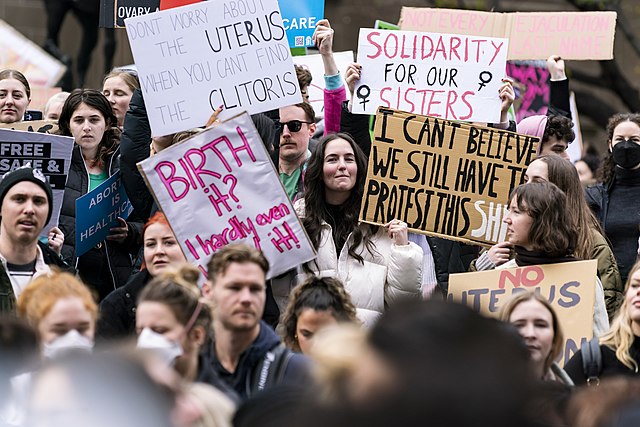
By Amelia Pooser
On June 24th, 2022, in a historic act, the U.S. Supreme Court discarded over 49 years of precedent from Roe v. Wade when they upheld a Missouri abortion ban in Dobbs v. Jackson Women’s Health Organization. The conversation sparked by this decision continued with this year’s federally required Constitution Day on campus. In the second of three events, Professors Alisa Kessel, Douglas Sackman, Suzanne Holland and Robin Jacobson held a talk on Sept. 16th discussing the implications of Dobbs v. Jackson on reproductive and constitutional rights.
Each professor discussed a unique aspect of reproductive rights and the Constitution. Professor Kessel analyzed SCOTUS’s decision through the lens of a political theorist, discussing the origins of the right to privacy and exploring the politicization of the issue.
Professor Sackman pointed out that the 14th Amendment was created partly to protect African American women from rape and forced reproduction, suggesting that abortion does have a historical basis in the 14th Amendment, directly contradicting Alito’s claims it is not rooted in history. Professor Jacobson returned to Justice Alito’s majority opinion, pointing out that he uses the phrase, “we return the power to the people and their elective representatives,” around 13 times. Jacobson argued that these decisions became a debate over state power.
Professor Holland continued by exploring abortion in the Bible and its connection to SCOTUS’s reading of the Constitution as a sacred text. Holland told a story from Exodus 21, where if an abortion took place, then a payment was to be made to the woman’s husband. Holland pointed out that this passage is followed by the famous “eye for an eye” declaration and that in the Bible, a fetus is not considered a life; abortion is akin to a property offense.
In an interview after the panel, the professors elaborated on their presentations. Professor Kessel pointed out the difference in treatment of “stand your ground” rights vs. abortion rights, saying, “It’s an interesting question to ask: why, when those kinds of rights are expanding and are being considered sacrosanct in some way, other rights and claims to bodily autonomy for other kinds of people are actually considered not sacrosanct?”
Professor Sackman then chimed in talking about the views of right-wing political parties, saying, “they go along with this notion that women are supposed to be confined to a private sphere of baby rearing,” bringing up an important point about the expectations guiding and motivating policymakers and justices. Professor Jacobson then adding on that the Republican Party has, to some extent, weaponized the right to abortion in their fight for states’ rights, explaining that “prior to the 80s, they actually had different views on abortion.”
While the subjects of this faculty panel were bleak, they served to push for political action. Professor Holland proclaimed: “Vote! Always Vote!”, elaborating, “Do not be apathetic.” Professor Jacobson added on by saying, “I think democracy, a multicultural democracy, is at stake in every election going forward.” Professor Kessel also noted that “this is the moment when you can probably, locally, really do important things to help, whether it’s giving money to funds or committing your time to helping with causes . . . on this particular issue.” Dobbs v. Jackson has definitely shown a new side of America, but with amazing educators like the professors mentioned above, the future is arguably brighter.
